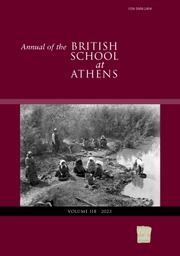No CrossRef data available.
Article contents
Some Problems of the Troad
Published online by Cambridge University Press: 11 October 2013
Extract
The preparation of the commentary on Strabo's account of Asia Minor undertaken by the Hellenic Society is seriously delayed by the war—not only from the general preoccupation with more immediate emergencies, but by the fact that several of the most important collaborators are actively employed on Government service in the Near East. Under the circumstances it may be pardoned if I publish some of my own material at once, in the hope that I may receive criticism and advice in some of the more difficult problems. I begin with one or two points in which further consideration has led me to modify views already made public. For the location of the sites mentioned I must refer the reader to the map of the Troad, Pl XXI., in B.S.A., xvii. All the places named are marked in Philippson's Karte des N. W. Kleinasien.
- Type
- Research Article
- Information
- Copyright
- Copyright © The Council, British School at Athens 1916
References
page 16 note 1 May I ask my readers to correct (without forgiving me) an unhappy slip on p. 276, where I have twice (lines 6 and 10) written Granikos where I meant Aisepos?
page 17 note 1 About two miles NE. of Argyria on the map.
page 17 note 2 About one mile NNW. of Karabey on the map.
page 18 note 1 Somewhere near the village of Chavush.
page 19 note 1 The same anecdote recurs, abbreviated, in the Suidas Life; Allen, ibid. p. 263. The future ἀνὴσει in place of ῖησιν seems necessary. See Allen's App. Crit. on both passages.
page 20 note 1 The Deli-tepe is marked on the map; the Karaman-tepe is about three miles ESE. of it.
page 23 note 1 The use of ψευδὰργυρος as a feminine seems surprising, but is paralleled by the same gender for λιθὰργυρος in Dioskorides.
page 24 note 1 Vol. i. (not numbered), ‘Fuel … Copper, Zinc, Brass, etc.’ (1861), pp. 518, 519.
page 25 note 1 I owe this reference, together with other valuable criticism and information, to Professor Huntington, of King's College, London.
page 27 note 1 It would seem, however, that the process of distillation was known to the Greeks as early as the fifth century, when it is described by Zosimos, who compiles probably from earlier sources. Into this question I cannot here enter more fully.—W. L.


